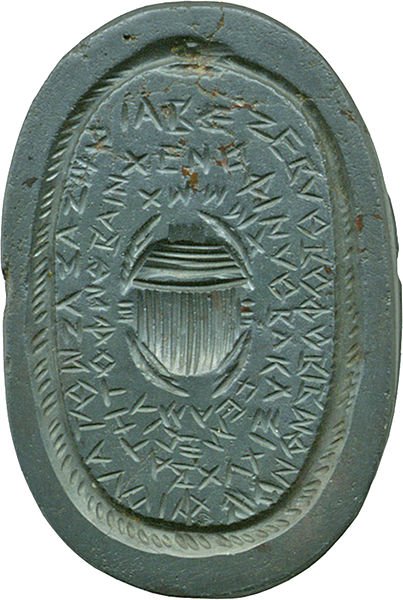G

Gnosticism is a syncretistic and loosely organized religious and philosophical movement which includes all the manifold systems of belief prevalent in the first two centuries of the Christian Era. Originating somewhat prior to Christian times, it combines various elements of Babylonian, Judaic, Iranian, Egyptian and Greek metaphysics with certain teachings of Christianity. The exact origins of this school of thought can be traced as far back as the second and first centuries BCE, such as the early treatises of the Corpus Hermeticum, the Jewish Apocalyptic writings, and especially Platonic philosophy.
As a name Gnosticism is derived from the Greek gnosis, “knowledge”, more specifically spiritual knowledge or esoteric wisdom, knowledge not attainable by ordinary intellectual processes and only to be gained by mystical enlightenment or the awakening of the higher elements in man. The emphasis on knowledge as the means of attaining a higher evolutionary stage and the claim to the procession of this knowledge in one’s own doctrine, are common features of the numerous groups in which the Gnostic movement historically expressed itself.
In spite of the diverse nature of the various Gnostic sects and teachers, certain fundamental elements serve to bind these groups together under the loose heading of “Gnosticism”. Chief among these elements is a certain manner of “rejection of this world”. According to the Gnostics, the material cosmos, is the result of a primordial error on the part of a supra-cosmic, divine being, usually called Sophia (Wisdom). This being is described as the final emanation of a divine hierarchy, called the Plêrôma (Fullness) at the head of which resides the supreme God, the One beyond Being. The error of Sophia, which is usually identified as a reckless desire to know the transcendent God, leads to the hypostatization of her desire in the form of a semi-divine and essentially ignorant creature known as the Demiurge, or Ialdabaoth, who is responsible for the formation of the material cosmos. This act of craftsmanship is actually an imitation of the realm of the Pleroma, but the Demiurge is ignorant of this, and hybristically declares himself the only existing God.
Renounce the whole world and the wole matter therein and all its cares and all its sins, in a word all its associations which are in it, that ye may be worthy of the mysteries of the Light. – Pistis Sophia III, 102.
Human nature mirrors the duality found in the world: in part it was made by the false creator God and in part it consists of the light of the True God. Humankind contains a perishable physical and psychic component, as well as a spiritual component which is a fragment of the divine essence. This latter part is often symbolically referred to as the “divine spark”. Humans are generally ignorant of the divine spark resident within them. This ignorance is fostered in human nature by the influence of the false creator and his Archons, who together are intent upon keeping human beings ignorant of their true nature and destiny. Anything that causes us to remain attached to earthly things serves to keep us in enslavement to these lower cosmic rulers. Death releases the divine spark from its lowly prison, but if there has not been a substantial work of Gnosis undertaken by the soul prior to death, it becomes likely that the divine spark will be hurled back into, and then re-embodied within, the pangs and slavery of the physical world.
Valentinus, the greatest of Gnostic teachers, taught that Christ and Sophia await the spiritual man at the entrance of the Pleroma, and help him to enter the bride-chamber of final reunion. Ptolemaeus, disciple of Valentinus, taught that even those not of pneumatic status, the psychics, could be redeemed and live in a heavenly world at the entrance of the Pleroma. In the fullness of time, every spiritual being will receive Gnosis and will be united with its higher Self thus becoming qualified to enter the Pleroma.
![]()











